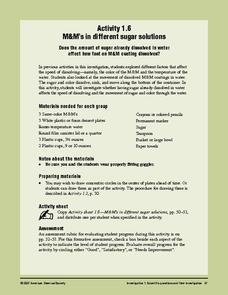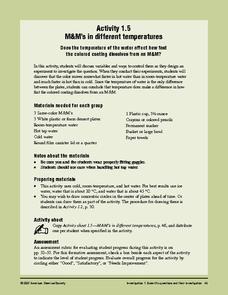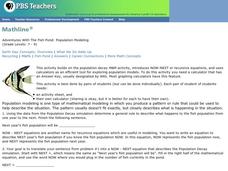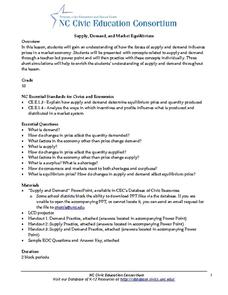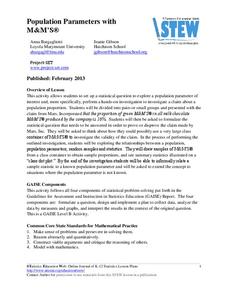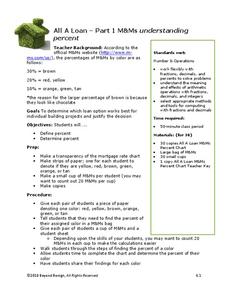Curated OER
M&M’s Math Worksheet
Who knew you could cover prediction, histograms, fractions, decimals, data collection, and averages (mean, median, and mode) all with a bag of M&M's®? Here's a fantastic set of worksheets to help you make candy a mathematical journey...
American Chemical Society
Mysterious M&M's
The first in a six-lesson mini unit, all using M&Ms® candies, this physical science activity gets kids to observe a single piece and discover what happens when it is placed in a plate of water. The activity can be used to...
PBS
Population Simulation with M&M's
Math and M&Ms® go great together when introducing a modeling activity. Allow your learners to simulate population growth and decay of fish in a pond and share their reasoning for the change in fish. With such an impact we have on our...
American Chemical Society
M&M's in Different Sugar Solutions
To conclude a mini unit on the dissolving of M&Ms® candy coating, this lesson plan investigates whether or not the concentration of sugar in the solvent affects the dissolving rate. Consider having older science learners write their...
American Chemical Society
M&M's in Different Temperatures
Help your class come up with a procedure for comparing the dissolving rates of colored candy coating in different temperatures of water. If you are placing importance on controlled variables with your class, make sure that they use equal...
PBS
Adventures With The Fish Pond: Population Modeling
Build up from the previous activity where your learners charted the population growth and decay of a fish pond with M&Ms®. Have them look at the data from that activity and create a Now-Next, or recursive equations, to predict the...
American Chemical Society
Investigating the Line
Note that this lesson is best paired with the preceding lesson in the unit. In that lesson, elementary physical scientists observed that the color coating of M&Ms® candies do not mix when dissolved off of the chocolate surface. Now...
Carolina K-12
Supply, Demand, and Market Equilibrium
An auction simulation, PowerPoint presentation, and candy M&Ms® are the perfect tools to help your learners understand the concept of supply, demand, and diminishing marginal utility. Here you'll find a thorough lesson plan that...
Stats Monkey
Everything I Ever Needed to Learn about AP Statistics I Learned from a Bag of M and M's®
Candy is always a good motivator! Use this collection of M&M's® experiments to introduce statistics topics, including mean, standard deviation, nonlinear transformation, and many more. The use of a hands-on model with...
American Statistical Association
A Sweet Task
Candy is always an effective motivator! A fun math activity uses M&M's and Skittles to explore two-way frequency tables and conditional probability. The candy can serve a dual purpose as manipulatives and experimental data.
Statistics Education Web
Population Parameter with M-and-M's
Manufacturers' claims may or may not be accurate, so proceed with caution. Here pupils use statistics to investigate the M&M's company's claim about the percentage of each color of candy in their packaging. Through the activity,...
LABScI
The Separation Lab: Candy Colors
There's no better motivator than candy! An engaging activity has pupils explore methods for separating mixtures. A two-part lab first explores methods of separation based on size and magnetism. The second activity introduces learners to...
Beyond Benign
All A Loan
When designing a house, it's important to know about percents. Through a series of three lessons, scholars first review percentages through an activity involving M&Ms and then apply that knowledge to calculate compound interest and...
American Chemical Society
Colors Collide or Combine?
As part of a unit investigating the dissolving of M&Ms® candy coating, this lesson examines whether or not the different colors combine. There are no new concepts revealed in this particular lesson, but learners will see that the...
American Chemical Society
Dissolving M-and-Ms
Learning ... how sweet it is! A hands-on lesson uses colored candies to demonstrate how positive and negative charges interact. Pupils use different types of liquids and watch as the color from the candies spreads—or doesn't.





